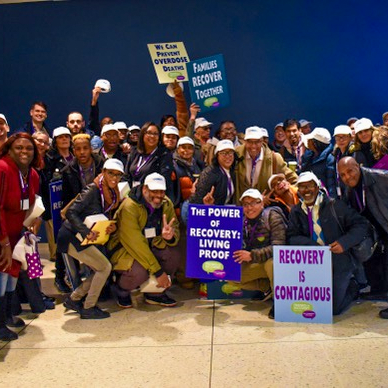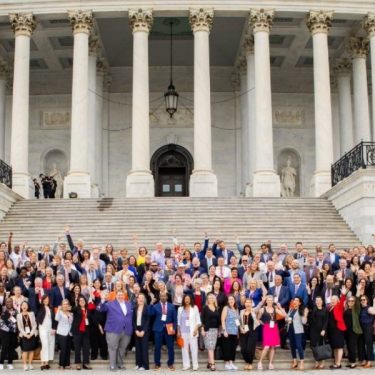(Pictured: Exponents members at the Stand Up for Recovery Conference in Albany, New York.)
Interview with Joseph Turner, President and CEO, Exponents Inc.
While recovery looks different for everyone, value, dignity and respect are essential for staying on its path. That’s especially true for individuals impacted by HIV/AIDS, substance use, incarceration and mental health challenges. We sat down with Joseph Turner to learn how Exponents — a National Council member organization in New York — is improving health and igniting hope.
Tell us a little about your organization.
“Exponents was founded in 1990 to maintain the exceptionally successful ARRIVE program, an HIV prevention/harm reduction/recovery readiness program for injection drug users and the formerly incarcerated that was originally funded as a three-year demonstration project by the National Institute of Drug Abuse. Since then, Exponents has employed a peer-driven model built on the voices and perspectives of persons with lived experience. Our engagement is based on value, dignity and respect for all, which has helped create a community where all steps toward transformation are celebrated.”
How are you putting people on the path to recovery?
“Through the absence of drug abstinence mandates, we have widened the net of individuals who are seeking and able to access our strengths-based, person-centered services and activities. Our service continuum includes educational support, housing placement assistance, reentry support for those transitioning out of jails and prisons, workforce development and treatment, harm reduction and recovery support for people who use drugs (PWUD). This enables us to create a holistic approach to addressing our community’s complex needs, thereby greatly increasing the opportunity to experience successful, transformative recovery.”
How are you involving your community in the work you’re doing?
“We always welcome new ideas, perspectives and programmatic suggestions from the communities we support. Our Visioning Board and Queer and Trans Advisory Committee meet quarterly to provide input on changing landscapes in the community and recommendations for moving forward, while addressing inequities and stigma. We also provide informational cards in our hygiene kits that have an embedded QR code, which allows individuals to detail their interactions with us. This serves as an invaluable tool in assessing trends, beliefs and the experiences of those we seek to serve.”
What are you doing to change how addiction is viewed and treated?
“Exponents was a pivotal player in the repeal of the draconian Rockefeller mandatory sentencing laws, providing testimony, organizing individuals with lived experience and drafting briefs for the community. We also continue to challenge negative, problematic stereotypes related to PWUD and the process of recovery. For example, we are in the middle of a social marketing campaign that, through personal testimonials, seeks to reduce and help eradicate the stigma and misperceptions related to problematic drug use and the different paths to recovery.”
How are you making a mark through harm reduction?
“In the three years since the development of our harm reduction-based trainings, we have provided them to legacy recovery institutions known solely for abstinence-based treatment modalities. These agencies have worked with us to revise operational policies regarding syringe possession in residences, enhancing the comfort level of clinicians discussing harm reduction and making referrals for services.
“Our reputation and credibility related to the implementation of self-directed paths to recovery resulted in us being approached to help found the New York State Harm Reduction Association. It has also led to us providing feedback to the Office of Addiction Services and Supports (OASAS) Commissioner, who requested we submit a proposal package to create additional harm reduction-based trainings for correctional and community supervision staff, as well as local police departments.”
What exciting things are you currently working on?
“We are expanding our efforts to engage PWUD and those experiencing homelessness in ways that address their current life situations, while providing support and encouragement to access increasingly structured programming that assist them in improving the quality of their lives. We are also evaluating the feasibility of becoming a dually certified (OASAS/Office of Minority Health) institution to expand our ability to provide mental wellness support from a licensed provider. We currently retain a psychiatric nurse practitioner to conduct a small number of virtual sessions that assist in diagnosis, medication prescribing and short-term therapy. It is our plan to expand and enhance this service with the addition of more hours for the psychiatric nurse practitioner, and eventually, retention of a psychiatrist.”
What does recovery mean to you?
“For us here at Exponents, recovery is a self-directed process (not an event) that encompasses collaborative goal setting and activities and supports increasing quality of life by the individual with problematic drug use. We say, ‘A person is in recovery when they say that they are.’”
The National Council’s membership consists of health care organizations and management entities across the U.S. that offer supports to millions of adults, children and families living with mental health and substance use challenges. Learn how to become a National Council member today!




